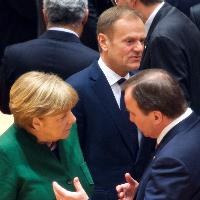(BRUSSELS) – European leaders left Brussels Friday after a two-day summit ended with a show of unity as they prepare for the EU’s 60th birthday celebrations later this month and for a future without Britain.
Meeting to prepare for the 60th anniversary of the Rome Treaties, the second day’ focused on the EU’s future with 27 members, with the idea of a multi-speed Europe coming to the fore, one of the options outlined in a Commission White Paper.
This was not universally welcomed: “Some expect systemic changes that would loosen intra-EU ties and strengthen the role of nations in relation to the community. Others, quite the opposite, are looking for new, deeper dimensions of integration,” said the re-elected Council President Donald Tusk, summing up the discussions.
Considering the interests of the 27 countries for the upcoming Brexit negotiations and the long-term strategic interests of the EU, his key task would be striving towards maintaining political unity among the 27: “Our main objective is to strengthen trust and unity among the 27,” he said. “All 27 agree with this objective,” he said.
Mr Tusk’s home country Poland, which had yesterday objected to Mr Tusk’s re-election, and refused to sign the Council’s conclusions, set itself firmly against a two-speed Europe, believing Poland would lose out if the bigger western countries moved forward together.
Commission president Jean-Claude Juncker expressed surprise that some saw the idea as “introducing a new dividing line between eastern and western countries.”
There is nothing new about a multi-speed Europe, he suggested, where “those who want to do more can do more.” It already exists, he said, citing examples such as in the Eurogroup, only 10 out of 19 are in favour of the financial transaction tax; the EU patent is not a political objective of all the member states, the divorce law is only supported by 17 Member States, and the European public prosecutor is a common intention only of 17 member states.
Mr Juncker said this was a debate about where the EU heads post-Brexit. In many ways, he said, Brexit was “encouraging the others to continue.” But he made clear that he didn’t like Brexit, “because I would like to be in the same boat as the British.”
He forecast that “The day will come, when Britain will re-enter the boat.”
At the summit, the leaders assessed the economic situation, concluding that the reforms are bearing fruit. They noted that Europe’s economic recovery is continuing with positive growth, and the outlook is encouraging; unemployment is at its lowest since 2009; and the state of public finances is improving and investment is growing.
The summit was bullish about ongoing negotiations on trade deals. They welcomed the positive vote in the European Parliament on the EU-Canada Comprehensive Economic and Trade Agreement (CETA) and looked forward to its imminent provisional application.
“The EU remains strongly committed to a robust trade policy and an open and rules-based multilateral trading system, with a central role for the World Trade Organisation (WTO),” the leaders said in a statement.
The leaders also confirmed that the EU is looking to ‘resolutely’ advance on all ongoing negotiations for free trade agreements, including with Mercosur and Mexico; to conclude soon negotiations with Japan; and to strengthen trade relations with China.
“Europe remains the champion of open, rules-based trade,” Council president Donald Tusk said at the European Council press conference. “At the same time we will not hesitate to defend ourselves against unfair trading practices, wherever necessary. We want to set the global standard for free and fair trade.”
On migration, the leaders said they stood behind actions undertaken by individual member states to support the Libyan authorities as well as their North African and southern neighbours.
They invited the Council to rapidly examine the Commission communication on a renewed action plan on return, and to pursue work on EU readmission arrangements with third countries.
Yesterday evening, the leaders discussed the situation in the Western Balkans. Leaders stressed the need of continuing on the reform path, good neighbourly relations and inclusive regional cooperation initiatives.
Mr Tusk said “we are not naive”, and spoke strongly against the “outside forces trying to destabilise the region.
WEe are not naive.



